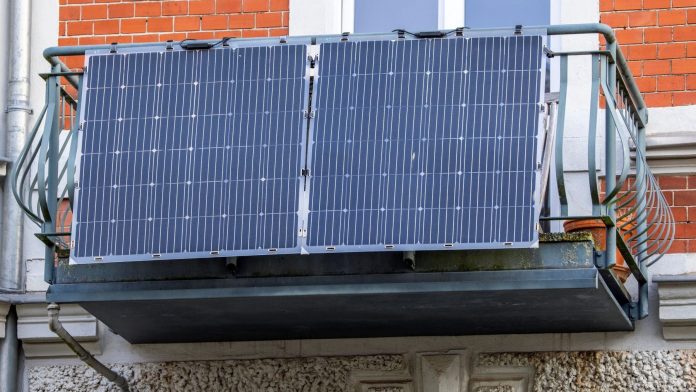The number of mini solar systems in Germany has more than doubled since the middle of last year. The bureaucratic effort is now lower.
Balcony power plants are booming. The number of plug-in solar systems registered with the market data register exceeded the half-million mark at the weekend, according to data from the Federal Network Agency. That is more than double since mid-2023. In the current quarter alone, after just over two months, more than 94,000 mini solar systems have already gone into operation. In all likelihood, the previous installation record of around 100,000 from the second quarter of last year will be exceeded.
For the first time, more than half a million systems were reached on Saturday, with 500,810. In the morning, the counter showed 503,134 as of Sunday. The actual number of balcony power plants is likely to be higher. Operators have one month to register after commissioning. In addition, some of the devices are simply not registered, despite the obligation to do so.
Registration obligation only with the network agency
The fact that the old quarterly record is shaky is probably due to the time of year and favorable offers for the systems. Since April 1st, registration in the market master data register is also sufficient. Previously, registration with the network operator was also required. The latest relief for users from the solar package, on the other hand, only came into force in mid-May. That is hardly enough time for strong effects.
Since May 16, for example, old electricity meters that run backwards when electricity is fed in can be used temporarily. “This temporary tolerance allows the device to be plugged in immediately after installation, regardless of which electricity meter is installed,” explained the NRW consumer advice center. The network operator decides whether and when the meter is replaced. They are not allowed to charge any costs for this.
Further changes are currently being prepared: Among other things, it could become more difficult for landlords and property owners' associations to prevent tenants or individual owners from installing power plants on their balconies. An agreement could be reached soon.
Network Agency: Plants are an opportunity to participate in the energy transition
The President of the Federal Network Agency, Klaus Müller, welcomed the development. “We have simplified the registration of balcony power plants and reduced the bureaucracy,” he stressed when asked by the German Press Agency. “This opens up the opportunity for many to take part in the energy transition. 500,000 registered balcony power plants are a strong signal.”
“A small energy revolution is currently taking place on Germany's balconies,” said Carsten Körnig, CEO of the German Solar Industry Association. “The energy revolution has finally reached tenants.” The plug-in solar devices represent a low-threshold opportunity for millions of energy consumers to participate. After bureaucratic obstacles have been removed, Körnig expects the trend to increase.
The small and comparatively cheap balcony power plants have gained in popularity since 2022 – also due to the sharp rise in electricity prices. In 2022, a good 65,000 new ones were registered, in 2023 almost 280,000, and this year the figure is more than 150,000. The systems, some of which are already available for a few hundred euros, consist of solar modules with an inverter. This converts the solar power into household electricity, which can then be fed directly into your own power grid via a socket.
Solar energy from the balcony reduces electricity bills
There, the electricity contributes to the operation of household appliances and thus reduces the amount of electricity you buy from your electricity provider – and therefore also your bill. Any excess electricity flows into the public grid free of charge.
According to the consumer advice center, whether such a system is worthwhile depends, among other things, on the purchase price and electricity price, but also on whether the module receives as much sun as possible for as long as possible at its location.
Despite the strong growth, mini power plants do not yet play a major role in electricity generation in Germany. Even with the current record level, their contribution is still less than one per mille.


